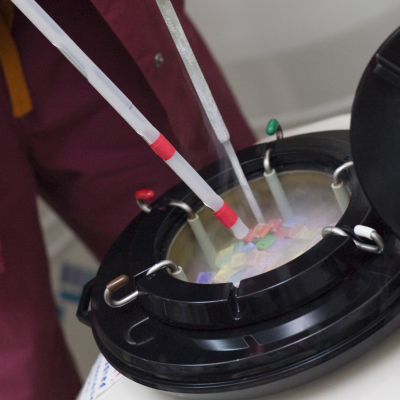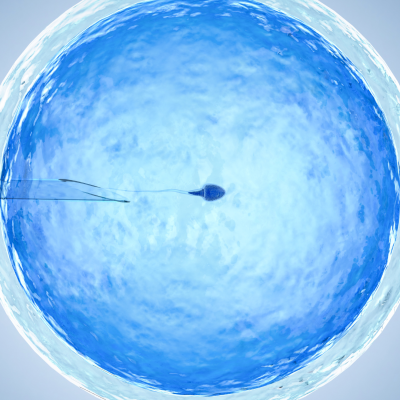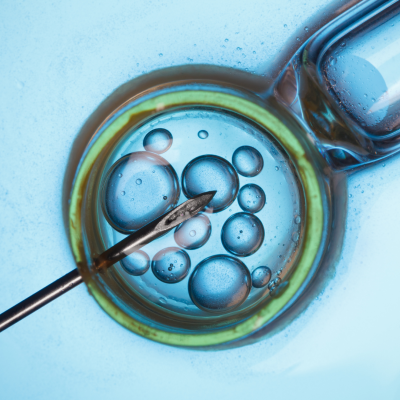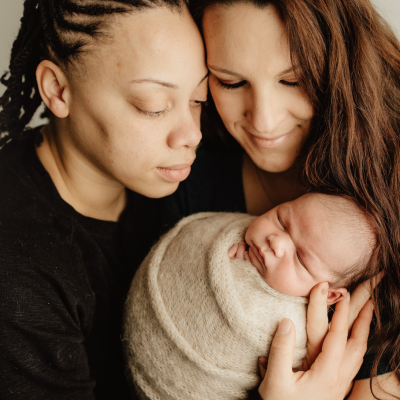IVF / Embryo Transfer
The physicians and staff at the California Center for Reproductive Health, with locations throughout the greater Los Angeles area, have helped numerous couples achieve their dream of having a baby through in vitro fertilization (IVF). Using the unique approach of creating customized IVF treatment protocols for each couple, has allowed Dr. Mor and CCRH to achieve consistently superior IVF success rates year after year.
IVF / Embryo Transfer Q & A
The most common form of assisted reproductive technology (ART) is in-vitro fertilization-embryo transfer (IVF-ET). IVF-ET involves fertilization of eggs with sperm in vitro (outside of the body), in the laboratory. The process involves stimulating a woman’s ovaries with injectable hormones (gonadotropins) to induce multiple eggs to grow, typically over a 7-9 day period. Some IVF protocols will require a “downregulation” step prior to stimulation, during which the ovaries are briefly suppressed before follicles are stimulated to grow; while in other protocols, no prestimulation suppression is needed. The prestimulation phase (with or without downregulation) may or may not involve a brief pretreatment with birth control pills. Once follicles reach a mature size (gauged by sequential vaginal ultrasound examinations and blood work obtained every 2-4 days during the stimulation phase), eggs within the follicles are triggered to mature, and then harvested in a minor surgical procedure under “twilight sleep” anesthesia. The egg retrieval procedure is done under direct transvaginal ultrasound visualization by advancing a needle through the vaginal wall and directly into the ovaries, where one follicle is aspirated at a time. Follicular fluid is examined carefully by the embryologist under microscopic visualization in an incubator for the presence of eggs. Next, eggs are mixed with sperm (typically provided by the patient’s partner through ejaculation; or by thawing frozen sperm as in the case of sperm donation) or injected with sperm in a process called intracytoplasmic sperm injection (ICSI) (as in the case of severe male factor infertility), in order to achieve fertilization. Fertilized eggs are then cultured under a strictly controlled environment within specialized incubators in the IVF laboratory for 3-5 days while they develop as embryos. Finally, embryos (or an embryo) are transferred into the uterine cavity for implantation.
Many natural processes leading to pregnancy are bypassed using IVF, allowing IVF to reach high success rates. IVF is an appropriate treatment protocol for virtually all infertility diagnoses: anovulation, tubal factor, male factor, endometriosis, cervical factor…
The California Center for Reproductive Health implements unique IVF stimulation protocols which are customized to each patient according to a multitude of factors (infertility diagnosis, age, weight/height, prior cycle outcome, prior reproductive history…). Our IVF clinic treats hundreds of patients each year with success rates which have consistently remained high and well above the national averages. Unlike many other IVF centers, our IVF clinic does not batch IVF cases (batching = multiple patients have their cycles synchronized on oral contraceptive pills so that start dates and end dates tend to be the same for the clinic/doctor’s convenience). Instead, we work week, month, and year-round to provide each patient excellence in reproductive care according to each patient’s individual medical needs and biological clocks.
CCRH IVF Success Rates
The California Center for Reproductive Health has consistently delivered high IVF success rates, exceeding national averages in practically all age groups. Cumulative live birth rates for 2021 (the latest reporting year) are featured below:
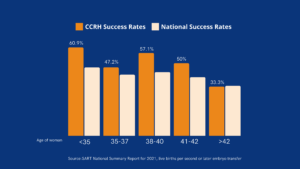
To learn more about our IVF clinic and services, contact us at 866.998.8225 (toll-free), or by e-mailing us at info@center4reproduction.com
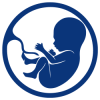
3,000+

20+

2X
Don’t just take our word for it!
Listen to what our patients have to say.
FAQ
What does a reproductive endocrinologist and infertility specialist do?
Reproductive endocrinology and Infertility is a sub-specialty of Obstetrics and Gynecology. In addition to managing medical and surgical treatment of disorders of the female reproductive tract, reproductive endocrinologist and infertility (REI) specialists undergo additional years of training to provide fertility treatments using assisted reproductive technology (ART) such as in vitro fertilization.
Reproductive endocrinologists receive board certification by the American Board of Obstetrics and Gynecology in both Obstetrics and Gynecology and Reproductive Endocrinology and Infertility.
When should I see an REI specialist?
In general, patients should consider consulting with an REI specialist after one year of trying unsuccessfully to achieve pregnancy. The chance of conceiving every month is around 20%, therefore after a full year of trying approximately 15% of couples will still not have achieved a pregnancy.
However, if a woman is over the age of 35 it would be reasonable to see a fertility specialist earlier, typically after 6 months of trying.
Other candidates to seek earlier treatment are women who have irregular menses, endometriosis, fibroids, polycystic ovary syndrome (PCOS), women who have had 2 or more miscarriages, or problems with the fallopian tubes (prior ectopic pregnancy).
What are the reasons we are having trouble conceiving?
Approximately 1/3 of the time cause for infertility is a female factor, 1/3 of the time a male factor, and the remaining 1/3 a couples’ factor.
At CCRH, we emphasize the importance of establishing a correct diagnosis. Both partners undergo a comprehensive evaluation including a medical history and physical exam.
Furthremore, the woman’s ovarian reserve is assessed with a pelvic ultrasound and a hormonal profile. A hysterosalpingogram (HSG) will confirm fallopian tube patency and the uterine cavity is free of intracavitary lesions. A semen analysis is also obtained to evaluate for concentration, motility, and morphology of the sperm.
Additional work up is then individualized to direct the best possible treatment option for each couple.
What is IVF? What is the process like?
In vitro fertilization (IVF) is the process that involves fertilization of an egg outside of a woman’s body.
The process starts with fertility drugs prescribed to help stimulate egg development. In your natural cycle, your body is only able to grow one dominant egg, but with stimulation medication we can recruit multiple eggs to continue to grow. After about 8-10 days of stimulation, the eggs are surgically retrieved and then fertilized with sperm in a specialized laboratory. Fertilized eggs are then cultured under a strictly controlled environment within specialized incubators in the IVF laboratory for 3-5 days while they develop as embryos. Finally, embryos (or an embryo) are transferred into the uterine cavity for implantation.
Should I have IVF?
Before deciding if IVF is the right choice, it’s important to sit down with an REI specialist to discuss available treatment options. For some people, other methods such as fertility drugs, intrauterine insemination (IUI) may be the best first choice treatment. At CCRH, we believe each individual couple is unique and not everyone needs IVF.
Is the IVF procedure painful?
While not painful, the fertility medications may some side effects including headaches, hot flashes, mood swings, and bloating. The injection sites may also bruise.
Will IVF guarantee a baby?
Unfortunately, no. Many people think once they start IVF it’s a matter of time that they will be pregnant and have a baby. But according to national statistics per the Society of Assisted Reproduction (SART), on average 40% of assisted reproduction cycles achieve live births in women under age 35. The chances of success then continue to decrease with advancing age.
At CCRH, we employ only evidence-based interventions to ensure patient safety and optimal outcome. While we cannot guarantee a baby, we guarantee that you will receive the best, most advanced, personalized care to help you maximize your chance of a baby.
What is the success rate for IVF?
The average IVF success rate (success measured in live birth rate) using one’s own eggs begins to drop around age 35 and then rapidly after age 40. This is due to the decline in egg quantity and egg quality as a woman ages.
Our clinic’s success rate consistently beats the national average year after year.
Do insurance plans cover infertility treatment? How much does IVF cost?
Individual insurance plans often do not have any coverage for infertility treatments. If you have a group plan, you can call members services to see if they have coverage for infertility (including consultation/workup and IVF).
After your consultation with our REI specialist, one of our dedicated account managers with sit with you to go over the cost of treatment.




